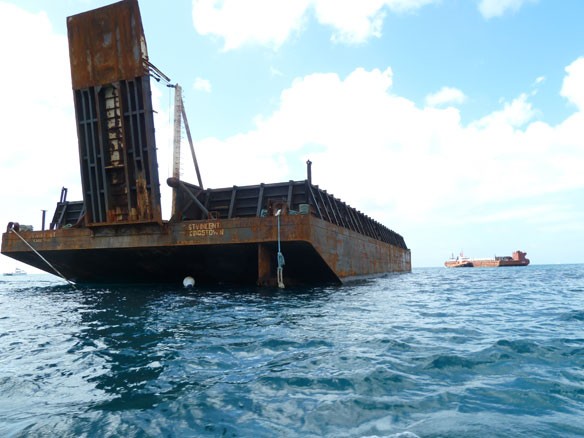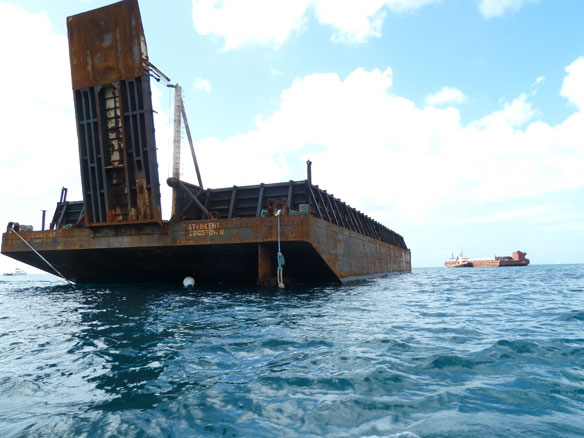
Sand barges in the Carribean waters, Grenadines. Photograph: © SAF — Coastal Care
Excerpts;
The 2016 Water Resources Development Act authorized the Army Corps of Engineers to study using foreign sand, such as from the Bahamas, to widen shorelines without resorting to expensive and inefficient truck hauls from inland mines. A year later the study remains unfunded in the agency’s budget.
The 2016 provision puts no timeline on the sand study, which includes domestic sand sources.
Read Full Article, The Naples Daily News (12-20-2017)
Us Warned: “Hands Off Our Beaches!”; Tribune 242 (01-04-2017)
The US is looking at Bahamian sand as a resource to shore-up Florida’s eroding coastline.
South Florida, Out of Beach, Wants to Buy Sand from the Bahamas, Slate (11-02-2017)
Miami-Dade County lost 170,000 cubic yards of sand during Hurricane Irma. It’s the latest blow to South Florida beaches in perennial decline. Nearly half the state’s coast—411 miles’ worth of beach—is considered “critically eroded.”
Replacing Miami’s beach sands costs millions. Here’s how Congress intends to make it cheaper; Miami Herald (10-24-2017)
Miami is out of sand. Last year, Miami-Dade County depleted its offshore sand reserves, meaning miles of beaches that shrink from erosion must be replenished with sand from outside South Florida…
How Hurricane Irma blew away the beach in Miami Beach; Miami Herald (09-19-2017)
Hurricane Irma smacked Miami Beach’s shoreline with enough wind and rain to reshape some of the water’s edge, including washing away chunks of sand from a recently completed $11.5 million beach widening project…
A swath of Miami Beach was washing away. The fix? Dump 285,000 tons of sand on it; Miami Herald (03-28-2017)
To widen a 3,000-foot stretch of Miami Beach’s shore that was washing away, the U.S. Army Corps of Engineers dumped 285,412 tons of sand on Mid-Beach, a $11.5 million project, funded with a combination of federal, state and county dollars….
Shrinking Shores: Florida reneges on pledges to its beaches; The Naples Daily News (11-17-2016)
The shores shrink, the tourists scatter, the tax base shrivels. That’s what troubles many communities across the state forced to shoulder the expensive burden of beach renourishment.
Sand’s end, The Verge (11-17-2016)
Miami Beach has run out of sand. Now what?..
Developers don’t get it: climate change means we need to retreat from the coast, Guardian UK (15-03-2016)
It is preposterous to build in areas that are bound to flood. So why are real estate companies still doing it?..
Column: High-rises spell the end for Florida beaches; By Orrin H. Pilkey and J. Andrew G. Cooper; Tampa Bay (07-25-2017)
Floridians are becoming more attuned to sea level rise and more familiar with nuisance flooding related to the rising sea. However, we believe there is less recognition that by century’s end it is likely that most of Florida’s major beaches will be permanently gone…
Where Sand Is Gold, the Reserves Are Running Dry, The New York Times (08-26-2013)
The Conservation Crisis No One Is Talking About, TakePart (09-21-2016)
Beaches around the world are disappearing. No, the cause isn’t sea-level rise, at least not this time. It’s a little-known but enormous industry called sand mining, which every year sucks up billions of tons of sand from beaches, ocean floors, and rivers to make everything from concrete to microchips to toothpaste…
Sand, Rarer Than One Thinks: A UNEP report (GEA-March 2014)
Despite the colossal quantities of sand and gravel being used, our increasing dependence on them and the significant impact that their extraction has on the environment, this issue has been mostly ignored by policy makers and remains largely unknown by the general public.
In March 2014 The United Nations released its first Report about sand mining. “Sand Wars” film documentary by Denis Delestrac – first broadcasted on the european Arte Channel, May 28th, 2013, where it became the highest rated documentary for 2013 – expressly inspired the United Nations Environment Programme (UNEP) to publish this 2014-Global Environmental Alert.
Sand Wars, An Investigation Documentary, By Mutlti-Awards Winner Filmmaker Denis Delestrac (©-2013)









